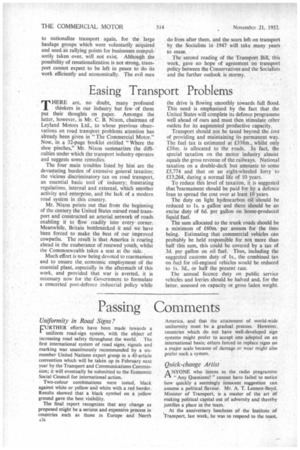Easing Transport Problems T HERE are, no doubt, many profound thinkers
Page 28

If you've noticed an error in this article please click here to report it so we can fix it.
in our industry but few of them put their thoughts on paper. Amongst the latter, however, is Mr. C. B. Nixon, chairman of Leyland Motors Ltd., to whose previous observations on road transport problems attention has already been given in "The Commercial Motor." Now, in a 32-page booklet entitled "Where the shoe pinches," Mr. Nixon summarizes the difficulties under which the transport industry operates and suggests some remedies.
The four main troubles listed by him: are the devastating burden of extensive general taxation; the vicious discriminatory tax on road transport, an essential basic tool of industry; frustrating regulations, internal and external, which smother activity and enterprise, and the lack of a modern road system in this country.
Mr. Nixon points out that from the beginning of the century the United States nursed road transport and constructed an arterial network of roads enabling it to flow readily into every corner. Meanwhile, Britain bottlenecked it and we have been forced to make the best of our improved cowpaths. The result is that America is roaring ahead in the exuberance of renewed youth, whilst the Commonwealth takes a seat at the side.
Much effort is now being devoted to rearmament and to ensure the, economic employment of the essential plant, especially in the aftermath of this work, and provided that war is averted, it is necessary now for the Government to formulate a concerted post-defence industrial policy while the drive is flowing smoothly towards full flood. This need is emphasized by the fact that the United States will complete its defence programme well ahead of ours and must then stimulate other outlets for its augmented productive capacity. Transport should not be taxed beyond the Cost of providing and maintaining its permanent way. The fuel tax is estimated at £338m., whilst only £38m. is allocated to the roads. In fact, the special taxation on the motor industry almost equals the gross revenue of the railways. National taxation on a double-deck bus amounts to some £5,774 and that on an eight-wheeled lorry to £13,264, during a normal life of 10 years.
To reduce this level of taxation, it is suggested that earmament should be paid for by a defence loan to spread the cost over at least 10 years.
The duty on light hydrocarbon oil should be reduced to Is. a gallon and there should be art excise duty of 6d. per gallon on home-produced liquid fuel.
The sum allocated to the trunk roads should be a minimum of £60m. per annum for the time being. Estimating that commercial vehicles can probably be held responsible for not more than half this sum, this could be covered by a tax of 3d. per gallon on oil fuel. Thus, including the suggested customs duty of Is., the combined tax on fuel for oil-engined vehicles would be reduced to Is. 3d., or half the present rate.
The annual licence duty on public service vehicles and lorries should be halved and, for the latter. assessed on capacity or gross laden weight.




















































































